Roman Tales is a italien film of genre Comedy directed by Gianni Franciolini with Franco Fabrizi
Roman Tales (1955)
Racconti romani
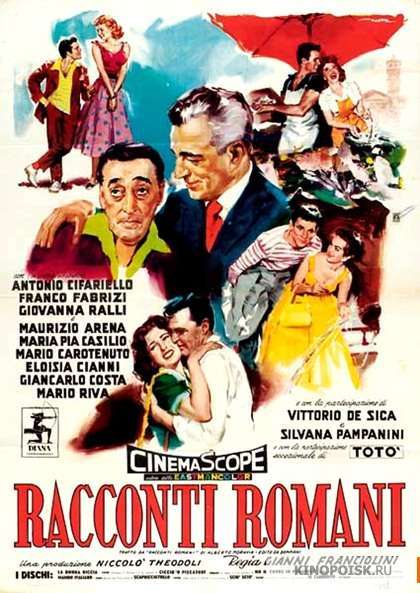
If you like this film, let us know!
Roman Tales (Italian: Racconti romani) is a 1955 Italian comedy film directed by Gianni Franciolini. It is based on several short stories collected in Racconti romani by Alberto Moravia. The film won two David di Donatello Awards, for best director and best producer.
Synopsis
In Rome, during the Fifties, three boys attempt to commit a robbery. They're Mario, Alvaro and Otello, which make use of the aid of a trickster, Professor Semprini, who claims to be a great intellectual. But the man is the garbage boy of the lawyer Mazzoni Baralla, upright man, who goes on the trail of the three boys as soon as they attempt the shot. Indeed Alvaro, Mario and Otello are arrested, after being deceived by Semprini, who pretends from them a payment for the design of the plan. In fact the three first attempt to pass off counterfeit notes, then pretend guards vice squad's team in Villa Borghese. After the arrest and exoneration, the three decide to return to their old and simple jobs.Actors

Franco Fabrizi
(Alvaro Latini)

Vittorio De Sica
(Mazzoni Baralla - the lawyer)

Giovanna Ralli
(Marcella)

Silvana Pampanini
(Maria)

Maurizio Arena
(Mario)
Comments
Leave comment :
Suggestions of similar film to Roman Tales
There are 375 films with the same actors, 15 films with the same director, 37238 with the same cinematographic genres, to have finally 70 suggestions of similar films.If you liked Roman Tales, you will probably like those similar films :
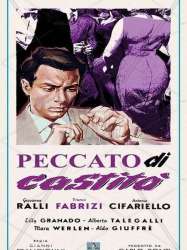
Peccato di castità (1956)
Directed by Gianni Franciolini
Genres Comedy
Actors Giovanna Ralli, Antonio Cifariello, Franco Fabrizi, Alberto Talegalli, Aldo Giuffrè, Toni Ucci
Rating24%





Adventures of a young married couple during their honeymoon trip. Because of a promise, Valentina has to resort to any trick to prevent the husband to consummate the marriage. The reality is that the woman, terrified by the suffocating climate existing since the time of their engagement between the families of the couple, made in secret to herself this vote.
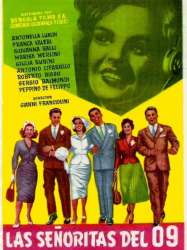
Le signorine dello 04 (1955)
, 1h40Directed by Gianni Franciolini
Origin Italie
Genres Drama, Comedy, Romance
Actors Giovanna Ralli, Antonella Lualdi, Antonio Cifariello, Marisa Merlini, Franca Valeri, Giulia Rubini
Rating63%





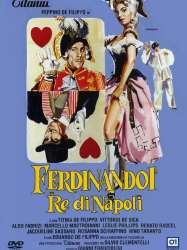
Ferdinand I King of Naples (1959)
, 1h45Directed by Gianni Franciolini
Genres Comedy
Actors Peppino De Filippo, Eduardo De Filippo, Vittorio De Sica, Aldo Fabrizi, Marcello Mastroianni, Renato Rascel
Rating64%





Naples, 1806. The king Ferdinand I of the Two Sicilies is frowned upon by the people, especially the comic theatrical Pulcinella, which continually delivers hard sermons, earning a reputation among the Neapolitans. Ferdinand one day gets angry and does condemn to death Pulcinella, while every night the king masquerades himself as populate with a false name, having fun in the taverns. Pulcinella unmasks him and invokes the rebellion of the people of Naples, that never comes. However, the cruelty of Ferdinand stops when Napoleon Bonaparte arrives in Italy. While the Neapolitans celebrate (false) freedom, Ferdinand makes a noble disguise his coachman while he wears populate dresses, and runs away from the city.
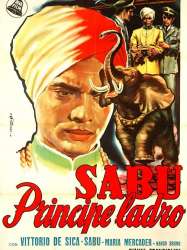
Hello Elephant (1952)
Directed by Gianni Franciolini
Genres Comedy
Actors Vittorio De Sica, Maria Mercader, Nando Bruno, Sabu, Gino Cervi
Rating65%






The Secrets of the Bed (1954)
, 1h26Directed by Michel Deville, Henri Decoin, Jean Delannoy, Ralph Habib, Claude Pinoteau, Gianni Franciolini, Pierre Zimmer, Jacques Rouffio, Fabien Collin
Origin France
Genres Comedy, Anthology film
Actors Jeanne Moreau, Richard Todd, Dawn Addams, Vittorio De Sica, Françoise Arnoul, Marcel Mouloudji
Rating56%





L'histoire réunit quatre passagers d'une automobile, bloqués en rase campagne par les intempéries. Partageant leur logis provisoire, ils racontent leurs déboires dont le point commun est un lit.

Hello Elephant (1952)
, 1h23Directed by Gianni Franciolini
Origin Italie
Genres Comedy
Actors Vittorio De Sica, Maria Mercader, Nando Bruno, Sabu
Rating65%





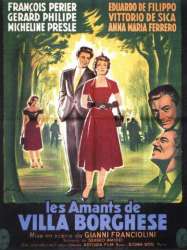
It Happened in the Park (1953)
, 1h38Directed by Vittorio De Sica, Gianni Franciolini
Origin Italie
Genres Drama, Comedy, Comedy-drama
Actors Maurizio Arena, Alberto Bonucci, Vittorio Caprioli, Eloisa Cianni, Antonio Cifariello, Eduardo De Filippo
Rating61%






We, the Women (1953)
, 1h35Directed by Alida Valli, Ingrid Bergman, Gianni Franciolini, Roberto Rossellini, Luchino Visconti, Luigi Zampa, Anna Magnani, Isa Miranda
Origin Italie
Genres Drama, Comedy, Comedy-drama
Actors Alida Valli, Ingrid Bergman, Isa Miranda, Anna Magnani, Anna Amendola, Emma Danieli
Rating64%





Portraits d'actrices italiennes, célèbres et débutantes.

Love on the Riviera (1958)
, 1h53Directed by Gianni Franciolini
Origin Italie
Genres Comedy, Romantic comedy, Romance
Actors Alberto Sordi, Marcello Mastroianni, Michèle Morgan, Sylva Koscina, Gabriele Ferzetti, Dorian Gray
Rating59%





Sur une plage chic de la Riviera italienne, à Tigullio en été, des relations passagères ou sentimentales entre maris, femmes et amants se font et se défont.

La sposa non può attendere (1949)
Directed by Gianni Franciolini
Genres Comedy
Themes Films about marriage
Actors Gino Cervi, Gina Lollobrigida, Odile Versois, Giacomo Furia, Cosetta Greco, Leopoldo Valentini
Rating60%





 Connection
Connection